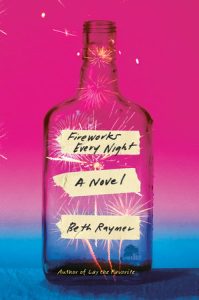
By Sharon Geltner
She had me at Palm Beach Mall.
Fireworks Every Night is a vivid, authentic story set in Palm Beach County. Author Beth Raymer labels the book as “fiction,” but she writes from her own lived experience.
And what an experience that was.
Similar to her protagonist, C.C. Borkoski (named for her father’s favorite Canadian Club whiskey), Raymer grew up with a sister who was an addict, a mother that wanted to be a teenager and a foreclosed family home. She watched her father have a nervous breakdown, walk away from his family and end up homeless.
For both families, real and fictional, that original trip to Florida seemed to be a gift, paid for with grift.
In real life and the novel, the family lived in a small, impoverished, southern Ohio town. Then C.C.’s dad’s car dealership suspiciously burns down (and he collects the insurance.) He drives the family to Florida and picks a $3,500 lot in Loxahatchee, where the living seems easy.
He promises: “Florida, we got it all. Motorsports, ribs, beer. You can drive on the sand right up to the ocean. Fireworks every night.”
Raymer is a real talent, with virtuoso powers of description of the “seedy wilds of 1990s south Florida.”
You’ll be reminded of Tara Westover’s Educated, Jeannette Walls’ The Glass Castle, Pat Conroy’s The Great Santini and maybe even Erskine Caldwell’s Tobacco Road.
Once the family is in Loxahatchee, “…We tied orange ribbons around the trees we wanted to keep. Through thick vine, over the soft circle of pine needles where the wild boar bedded down, muck oozed into my green glitter jellies.”
In the meantime, “…we moved into Lion Country KOA, the cheapest housing option around while our home was being built. Outside our tent screen stretched taut against mosquitoes, gators snarled like chain saws.”
“We visited neighboring RVs for tarot-car readings and burritos stuffed with soft-shell turtle pulled straight from the canal.”
Swimming in the pool after dinner, “Floating on my back, I caught every sunset. Even the moon was warm.”
Raymer’s book is filled with real places. Peanut Island. Shopping at Lord & Taylor at Palm Beach Mall (back when it had a movie theater and was encircled by guard towers.) “Stripping at T’s Lounge,” “caddying at Binks Forest,” driving on Blue Heron Boulevard and Seminole Pratt. C.C. browses pawn shops where “Sparkly trinkets slinked over one another like reptiles inside a terrarium.”
When it comes to family and friends, Raymer is profound, “The opposite of addiction is not sobriety; it’s connection with people.” And this insight: “The urge to conceal isn’t always about shame. Sometimes it’s about self-preservation.”
No matter her father’s diminished circumstances, C.C. remains respectful and compassionate, but not to her mother. Chronically broke, her mother’s email address is: MissPalmBeach@aol.com.
“Here was a woman in her fifties who had done unspeakable things to immediate family members. She had no contact with either of her children. Her granddaughter was a teenager and she had yet to meet her. So much rupture, so much severing, yet she showed not an iota of pain, shame, or self-consciousness. [As she poses for selfies in her trailer] she looked beautiful and proud.”
In her senior year of high school, C.C. loses out on a college basketball scholarship. Apparently uneducated beyond high school, she somehow finds a job doing PR and fundraising for the “Florida Zoo.” The vivid family scenes fade and the book loses its thread as C.C. unhappily stumbles through her job and unrealistic scenarios.
C.C. frequently lectures staff and her boss about not doing enough to protect animals and urging them to relate to bats as family members. She resents rich, generous donors who are not politically correct. One philanthropist gives multi-millions for an animal hospital with Tesla MRI scanners. But since she won’t allow zoo brochures to mention “global warming,” she is evil.
There are non-sequiturs about bats’ faces destroyed from white-nose syndrome, manatees who are too cold in Florida, a gorilla and a strange, depressed rambling about a drone named “Bev.” These passages sound like an environmental attempt at the Leonard Cohen song, Everybody Knows.
The book’s glamorous opening has little to do with the rest of the story. At some point, C.C. moved north and effortlessly nabs a very rich man. Her engagement party is at the in-law’s mansion on Long Island Sound. Standing with her $10,000-a-month trust fund fiancé, CC is envied and admired.
She thinks, “I feel it in my gut: Wow, did I pull one over on him.”
How refreshing!
But C.C. soon concludes, “To be rich is to be in captivity.” Too much of the book is spent on how she relentlessly destroys her chances for a happy marriage.
Fireworks was written over “years and years” with four editors, which may account for the lack of continuity and why parts of the book don’t mesh.
However, Raymer has sold another book to Random House. This one will be nonfiction and “…is reportage set in Lake Worth, Loxahatchee, Wellington and Palm Beach,” she said. The publisher announced the book will cover the author’s childhood.
Sounds like us locals will have a lot to anticipate.
Fireworks Every Night, by Beth Raymer, Random House, 224 pp., $27
Sharon Geltner is the author of Charity Bashed, a Palm Beach mystery and social satire, available on Amazon.